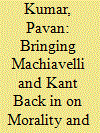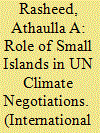| Srl | Item |
| 1 |
ID:
167056


|
|
|
|
|
| Summary/Abstract |
After painful reform and restructuring of post-1997 financial crisis, many scholars equated South Korea’s ‘post-developmental state’ with neo-liberal state. However, in doing so, they ignored South Korea’s lasting legacy of interventionist ‘developmental state’ that led nation’s miraculous transformation from a poor agrarian society to a prosperous industrial economy. This article stresses that South Korea indeed tried to adopt some of the policy prescriptions suggested by neo-liberal ideas but moving beyond the dictates of neo-liberalism it also strengthened state capacity to augment non-market mechanisms.
|
|
|
|
|
|
|
|
|
|
|
|
|
|
|
|
| 2 |
ID:
167060


|
|
|
|
|
| Summary/Abstract |
This article is an attempt to understand the idea of morality in two of the most influential philosophers Niccolo Machiavelli (The Prince and Discourses) and Immanuel Kant (Perpetual Peace and Metaphysical Elements of Justice). Machiavelli and Kant are chosen because both of them are the most cherished philosophers in their fields. Machiavelli’s name is associated with realism, and he got a bad name because of his alleged cruel advice to maintain the state. His name is equalled with cunningness, murder, treachery. On the other hand, Kant is the founding figure of idealism in politics. His focus on categorical imperative and human capabilities to attain the higher moral goals made him one of the most well-known philosophers on idealism. To understand the ethical problems of the day emphasis is given to the classic writings of scholars who have written extensively on morality, justice, state, power, human rights and individual freedom. This article is an attempt to answer the following questions: Is the state in itself a highest moral actor? Can there be an individual morality above the state? What should be the yardstick to judge an act—the act in itself or the outcome of the act? What are the duties and rights of the individual in domestic society and can there be a similarity of morality at the level of political leaders in international politics? The paper argues that both Machiavelli and Kant were dealing with different contexts and societies, and morality for them had different meanings. However, the end justifies the means dictum is not the right way to understand Machiavelli on morality.
|
|
|
|
|
|
|
|
|
|
|
|
|
|
|
|
| 3 |
ID:
167059


|
|
|
|
|
| Summary/Abstract |
The defence and foreign policy communities in the Global South should learn from the lessons of security governance that followed the 13-year United Nations Stabilization Mission in Haiti (MINUSTAH). To better inform the academic and policy debate, this article extrapolates ideas from the case study of Chile, one of the ‘big four’ Latin American peacekeeping providers in Haiti, along with Argentina, Brazil and Uruguay. The article examines Chile’s finished compromise with the MINUSTAH in order to shed light on conflict intervention strategies and its peace operations in Colombia and the Central African Republic. It argues that military policies for peace intervention purposes should undergo a critical reassessment in light of the state steering away from the past use of long-term brute force. Today’s changing security environment favours a set of different human security policies that have become more prevalent for peacekeeping policymaking. Engaging in scenarios of war and peace thus demands a more focused, experienced and tactical use of military and diplomatic resources than governments in the developing countries currently possess.
|
|
|
|
|
|
|
|
|
|
|
|
|
|
|
|
| 4 |
ID:
167057


|
|
|
|
|
| Summary/Abstract |
This article opens a dialogue between different notions of conflict and the sociology of power and suggests a new theoretical framework for the analysis of international conflicts. Refusing to consider abstract entities as actors, it helps us better determine who the relevant actors are in each international conflict and gives special attention to the existing power relations between them. Accordingly, it is considered that a large social system is made up of numerous actors with multiple conflicts between them. Thus, in the case of international conflicts, we do not face one single conflict, but a conflictual complex involving a multitude of actors with their different power resources, who weave a network of conflicts and power relations between them, and at its top a dominant conflict, the conflict around which the other conflicts evolve. Acknowledging the complexity of international conflicts, this new theoretical approach should better explain both the behaviour of the actors and the evolution of the conflictual complex itself.
|
|
|
|
|
|
|
|
|
|
|
|
|
|
|
|
| 5 |
ID:
167055


|
|
|
|
|
| Summary/Abstract |
This article is about small island developing states (SIDS) and their role in the United Nations (UN) climate negotiations. It presents a discussion about how a constructivist model of foreign policy analysis and international system design can be used to explain the impact of climate ideas of SIDS on UN climate system. The SIDS have been in the UN climate negotiations since the 1980s, committed to a climate agenda with clear ideas about the challenges they face and the type of solutions they seek from the international policy community. In this respect, this article seeks to explain that climate ideas shared among SIDS have established an intersubjective understanding to promote a compelling common voice at international climate negotiations, which is based on an island vulnerability identity. These ideas have shaped the policy thinking and interests of climate negotiators to design institutional frameworks that have given special consideration to SIDS. It concludes that this observation represents a disproportionate impact of SIDS. Despite the weak material powers for being small islands, their climate agenda has influenced the UN system design to address their concerns.
|
|
|
|
|
|
|
|
|
|
|
|
|
|
|
|